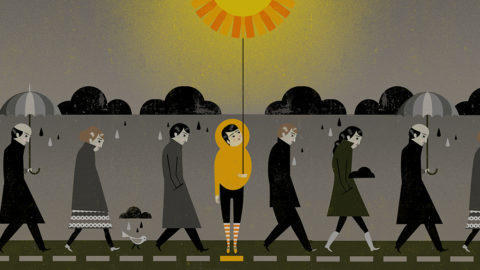
In this bustling world we inhabit, we’re bombarded with societal expectations and ideas about how we “should” feel. So, if you’ve got a decent job, a supportive family, and financial stability, you ought to be fulfilled, right? Well, what happens if you find yourself grappling with mental health issues, despite your life seeming perfect from the outside? Does this make you ungrateful? Absolutely not. Let’s delve into why this is.
Mental Health Does Not Discriminate
First off, it’s crucial to understand that challenges like anxiety and depression aren’t picky. Whether your life is outwardly perfect or not, these troubles can affect anyone, regardless of their situation. They aren’t tied to the tangible facets of our lives, and they certainly don’t take into account societal expectations of happiness.
[Image: A brain depicted with various emotions in an array of colors.]
The Complexity of the Human Mind
Our brains are intricate. They don’t operate on “shoulds” or “shouldn’ts.” Instead, they run on a complex mixture of chemicals, life experiences, genetics, and much more. Sometimes, this complexity can lead to certain glitches, resulting in mental health problems. Feeling down, anxious, or overwhelmed isn’t indicative of ingratitude—it’s a sign that something within this elaborate system might be out of balance.
Subjectivity of Experiences
Furthermore, it’s key to remember that each person’s life experience is unique. We all have our own lenses and viewpoints through which we interpret the world. We process situations, interactions, and events based on these unique perspectives. If you’re feeling down despite leading a “good” life, it doesn’t mean you’re ungrateful; it simply means you’re experiencing the human condition.
Growth Through Emotional Struggles
Notably, emotional struggles can sometimes signal growth. When emotionally challenged, we’re often forced to face aspects of our lives or our selves that we may have been ignoring or suppressing. This journey, though painful, can lead to significant personal growth and deeper self-understanding.
It’s Okay to Ask for Help
If you’re wrestling with mental health issues, bear in mind it’s not indicative of ingratitude. It’s a sign that you’re human and it’s perfectly acceptable to ask for help. Don’t hesitate to reach out to a mental health professional who can guide you through your feelings and help you navigate your way to a healthier state of mind.
True Mental Health
At the end of the day, real mental health isn’t about maintaining a perfect facade. It’s about achieving balance and contentment within. There’s absolutely nothing ungrateful about seeking that.







